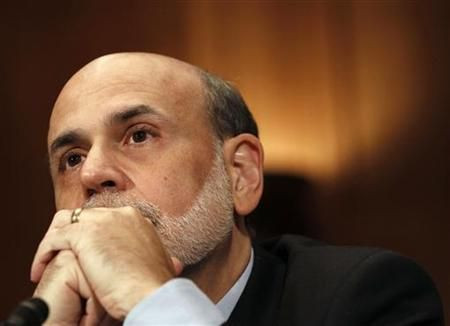Fed to Hold Steady Despite Global Risks

The Federal Reserve looks set to take a breather from monetary stimulus measures on Wednesday, even if financial market turbulence heightens the chances of action later.
The U.S. central bank's debate over the course of policy, including a potential shift toward using a concrete set of targets for inflation and the jobless rate as policy triggers, comes against a troubled global backdrop and with the U.S. economy far from full health.
Greece's call for a referendum on the latest euro zone debt deal dashed hopes Europe had finally come to grips with its debt crisis, sending global equity markets into a tailspin.
The U.S. recovery, for its part, remains anemic and could be knocked off course if Europe fails to quell its crisis.
A report on Wednesday showed U.S. private-sector payrolls expanded by 110,000 workers in October, not enough to signal a robust hiring revival, while data on Tuesday showed growth in the manufacturing sector slowed to a crawl, although new orders rose.
The U.S. economy grew at a 2.5 percent annual pace in the third quarter, a significant improvement over the second quarter's 1.3 percent increase but still too soft to put a dent in the nation's 9.1 percent unemployment rate.
An ongoing if modest U.S. recovery provides room for the Fed to pause as it mulls offering newly detailed guidance on its policy goals or making another round of asset purchases.
There is some talk that the Fed will announce renewed mortgage-backed securities purchases, but we are not convinced the Fed is there, said Marc Chandler, global head of currency strategy at Brown Brothers Harriman.
Increasing the balance sheet remains an option that the Fed refuses to reject. We expect the option not to be exercised unless there is a material risk of a renewed U.S. economic contraction or that the risks of deflation increase markedly, Chandler said.
A shift to a new communications framework is another option the Fed is considering. It could offer hints on where its internal debate stands through tweaks to its post-meeting statement or comments from Fed Chairman Ben Bernanke at his news conference.
The Fed, which resume its two-day meeting at 8:30 a.m. (1230 GMT), is set to release its statement at the conclusion of the meeting at around 12:30 p.m. (1630 GMT). It will issue fresh economic forecasts at 2 p.m. (1800 GMT), and Bernanke's news conference will follow 15 minutes later.
Fed officials, in their quarterly forecasts, are almost certain to lower projections for growth next year, while raising their estimates of unemployment, which would suggest further easing would remain on the table.
Faced with a still-weak recovery, the Fed decided in September to embark on a program to sell $400 billion in short-term Treasuries and invest the money in longer-dated bonds, an effort to keep long-term rates down.
It also dipped back in the mortgage market by reinvesting proceeds of its real estate bond holdings back into MBS.
Those actions followed an already aggressive series of steps to try to lift the economy. The central bank slashed benchmark interest rates to effectively zero in December 2008 and expanded its balance sheet to a record $2.8 trillion.
More recently, Fed Governor Daniel Tarullo and New York Federal Reserve Bank President William Dudley have hinted at the possibility of expanding the central bank's presence in the mortgage market. It has already bought some $1.25 trillion in MBS.
MBS purchases are seen as even more controversial than Treasury bond buys. Some Fed officials worry targeting a specific sector of the economy encroaches on fiscal policy, and policymakers had previously pledged to return to an all-Treasury portfolio.
© Copyright Thomson Reuters 2024. All rights reserved.





















